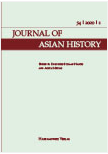
Chen Fei
Journal of Asian History
Vol. 54, No. 1 (2020), pp. 131-156
Abstract: This study focuses on a Buddhist monk named Kawaguchi Ekai, the first Japanese to reach Lhasa. Kawaguchi risked his life to bring back to Japan a large amount of Sanskrit originals and Tibetan translations of Buddhist scriptures, which helped build the foundation for the academic study of Buddhism in modern Japan. Kawaguchi’s impressive faith, courage, and contribution produced an aura around him that often overshadowed the intricate connection between his journey and the rise of national imperialism in Meiji Japan. I argue that he viewed Tibet through an Imperial lens, transforming Tibetans into irrational and backward barbarians in his widely circulated book Chibetto ryokōki. Through careful examination of his writings, I provide a critical reappraisal of his journey in Tibet and its domestic and international impact. My aim is to use the microhistory of this Buddhist monk to explore an important subject in macrohistory – the mechanism of global imperialism. I will discuss how this ideology spurred Kawaguchi’s passion for preaching in Asia, shaped his decision to go to Tibet, and structured his understanding of Tibet. Furthermore, I will examine Kawaguchi’s legacy, which not only fueled national imperialism in Japan but also inspired the predatory policy the Manchu court adopted in dealing with Tibet in the 1900s.
About the author: Chen Fei is a HYI Asia-Pacific Studies Training Program Visiting Scholar from 2020-21.
